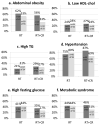Effect of Resistance Training and Caloric Restriction on the Metabolic Syndrome
- PMID: 27741216
- PMCID: PMC5315658
- DOI: 10.1249/MSS.0000000000001122
Effect of Resistance Training and Caloric Restriction on the Metabolic Syndrome
Abstract
Purpose: The prevalence of metabolic syndrome (MetS) is greatest in older obese adults, and effective evidence-based treatment strategies are lacking. This study determined the efficacy of adding caloric restriction (CR) for weight loss to resistance training (RT) on MetS and its individual components in older overweight and obese adults.
Methods: We performed a 5-month randomized controlled trial in 126 older (65-79 yr) overweight and obese (body mass index = 27-35 kg·m) men and women who were assigned to a progressive 3-d·wk moderate-intensity RT with (RT + CR) or without caloric restriction (RT). MetS components, according to the National Cholesterol Education Program Adult Treatment Panel III, were determined before and immediately after the interventions.
Results: Body mass decreased in RT + CR (-5.67% loss of initial mass) but was unchanged in RT (-0.15%). Compared with RT, RT + CR resulted in reduced VLDL cholesterol, triglycerides, and systolic and diastolic blood pressures (P between 0.000 and 0.013). The RT group showed no significant within-group changes in MetS criteria. Abdominal obesity, hypertension, the number of metabolic abnormalities and the presence of MetS significantly decreased with RT + CR. There were significant group differences for abdominal obesity, hypertension, and number of metabolic abnormalities.
Conclusion: RT + CR is an effective strategy for improving some of the metabolic abnormalities associated with MetS among older overweight and obese adults.
Conflict of interest statement
Conflict of Interest: None of the authors reported a conflict of interest related to the study.
Figures
References
-
- Banz WJ, Maher MA, Thompson WG, Bassett DR, Moore W, Ashraf M, et al. Effects of resistance versus aerobic training on coronary artery disease risk factors. Experimental biology and medicine (Maywood, NJ) 2003;228(4):434–40. Epub 2003/04/03. - PubMed
-
- Bateman LA, Slentz CA, Willis LH, Shields AT, Piner LW, Bales CW, et al. Comparison of aerobic versus resistance exercise training effects on metabolic syndrome (from the Studies of a Targeted Risk Reduction Intervention Through Defined Exercise - STRRIDE-AT/RT) Am J Cardiol. 2011;108(6):838–44. doi: 10.1016/j.amjcard.2011.04.037. Epub 2011/07/12. - DOI - PMC - PubMed
-
- Borkan GA, Hults DE, Gerzof SG, Robbins AH, Silbert CK. Age changes in body composition revealed by computed tomography. J Gerontol. 1983;38(6):673–7. Epub 1983/11/01. - PubMed
-
- Bouchonville M, Armamento-Villareal R, Shah K, Napoli N, Sinacore DR, Qualls C, et al. Weight loss, exercise or both and cardiometabolic risk factors in obese older adults: results of a randomized controlled trial. Int J Obes (Lond) 2014;38(3):423–31. doi: 10.1038/ijo.2013.122. Epub 2013/07/05. - DOI - PMC - PubMed
Publication types
MeSH terms
Grants and funding
LinkOut - more resources
Full Text Sources
Other Literature Sources
Medical


